1109 5th Ave at 92nd St
New York, NY 10128
Directions
Plan your visit to the Jewish Museum and discover the intersection of art and Jewish culture Learn More
The Jewish Museum is closed today.
The Jewish Museum is closed today.
1109 5th Ave at 92nd St
New York, NY 10128
Directions
Plan your visit to the Jewish Museum and discover the intersection of art and Jewish culture Learn More




This is my last letter as director of the Jewish Museum, and I hope you’ll take time to click on a video about my tenure as told through some of the amazing artists who have been presented here.
What are my takeaways after 12 years here?
I have learned so much about my own Jewish culture and heritage that I didn’t know about. When I joined the Museum, my mother finally told me that my father grew up in an Orthodox family that kept kosher. I never knew that.
I’ve loved making the Museum a more contemporary and art-centered place.
I’ve loved how the Museum made me more Jewishly centered.
I have come to understand that Jewish values match my own values, which is beneficial and personally meaningful to me.
I revel in the singularity of this place, where some of the world’s finest Jewish ritual and ceremonial art sits side by side—completely naturally—with seminal works of modern and contemporary art. (Only at the Jewish Museum could you find John Singer Sargent’s paintings displayed across from a 16th-century fragment from the Cairo Genizah in our current show The Sassoons.)
I am happy to see other art museums across the country presenting and collecting Judaica.
I am gratified that we helped encourage new forms of artistic expression through our Judaica commissions and creative modes of display.
I love that, as audience demand for Judaica widens, so too does the reach of the stories these objects tell.
I have also seen antisemitism grow and proliferate—not only abroad, but here in the United States, in New York, and in some cases directed specifically at the Jewish Museum. This is one of the rare things I’ve seen during my tenure that has changed for the worse.
I don’t know the answers. It’s not a perfect world.
I leave you with the timeless words of Leonard Cohen, the subject of our 2019 exhibition:
"Ring the bells that still can ring / Forget your perfect offering / There is a crack in everything / That's how the light gets in"
The Jewish Museum will always have a very special place in my heart. Thank you for so generously supporting it.

Claudia Gould, Helen Goldsmith Menschel Director
Marc Chagall’s painting Le Père (1911), a rare portrait of the artist's father which was recently restituted to the descendants of its original owner, will be on view in the Constellations galleries through January 1, 2024 as a special loan to the Jewish Museum. New in the Taxonomies gallery, visit now and be among the first to see Rachel Feinstein's Marriage Ring (2023). This exciting commission is featured in the "New Acquisitions" section of this issue and in the March 16 issue of Architectural Digest; and exquisite limited-edition versions of the ring are available for purchase at the Jewish Museum Shop.
The Sassoons reveals the fascinating story of a remarkable Jewish family, following four generations from Iraq to India, China, and England through a rich selection of works collected by family members over time. Read more about several of the works on view, on loan from His Majesty King Charles III, in this issue.
After “The Wild”: Contemporary Art from The Barnett and Annalee Newman Foundation Collection highlights works by 47 intergenerational and internationally-based artists made between 1963 and 2022, drawn from a larger gift to the Jewish Museum in 2018 comprising a striking range of contemporary artworks made by the recipients of The Barnett and Annalee Newman Foundation Award.
The first museum exhibition honoring the visionary Jewish entrepreneur Gaby Aghion (1921-2014) and her legacy as the founder of the French fashion house Chloé, Mood of the moment highlights Aghion’s vision of effortless, luxurious fashion, and the work of iconic designers who began their careers with the brand. The exhibition showcases Aghion as a leader whose work altered the course of the global fashion industry in liberating women's bodies from the restrictive attitudes and styles of the time, as well as pioneering the emergence of luxury ready-to-wear. By capturing the mood of the moment, Aghion founded a fashion brand characterized by an easy elegance.

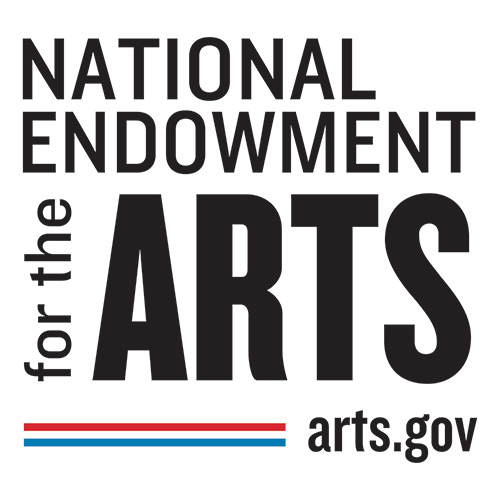




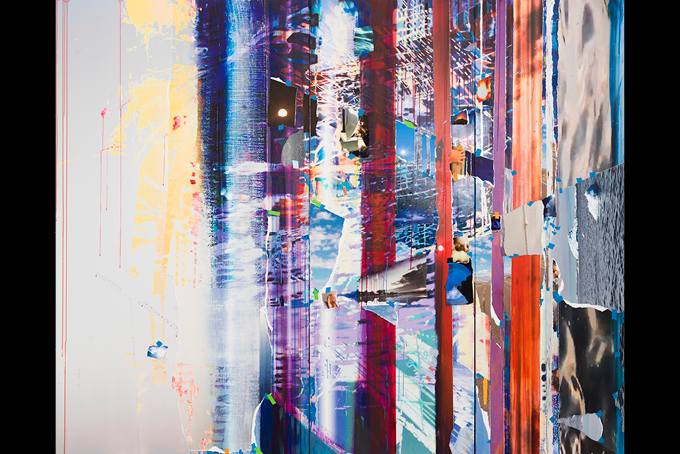
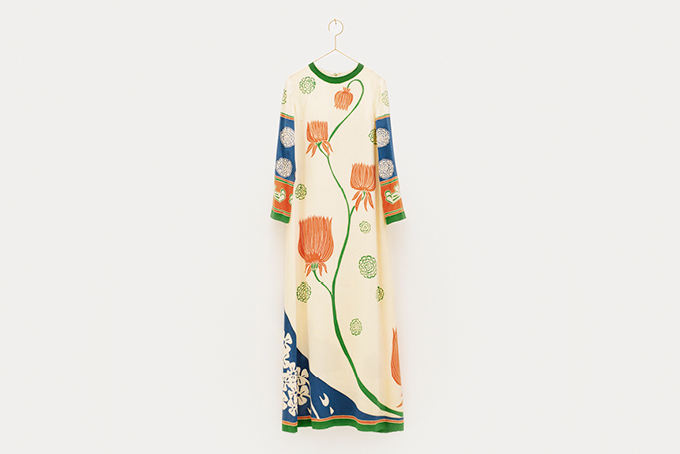
On view through August 13, The Sassoons reveals the fascinating story of a remarkable Jewish family, highlighting their pioneering role in trade, art collecting, architectural patronage, and civic engagement from the early 19th century through World War II. The exhibition follows four generations from Iraq to India, China, and England, featuring a rich selection of works collected by family members over time.
Mumbai, Hong Kong, and Shanghai were way stations in the long process of acculturation by which the Sassoons gradually reshaped their identity. By the late 19th century, those family members who had settled in England were approaching the pinnacle of their social, cultural, and political aspirations. What began as a pragmatic alliance with British imperialism developed into a deeply felt identification and patriotic loyalty to British culture. Discerning collectors, generous philanthropists, and consummate hostesses, the Sassoon women were seminal to the family’s integration into British society. Rachel Sassoon Beer (1858–1927) became the first woman in Britain to edit two newspapers, The Sunday Times and The Observer, and played a crucial role reporting on the Dreyfus affair, an infamous antisemitic political scandal in France at the turn of the 20th century. Her remarkable art collection featured paintings by Peter Paul Rubens, Gustave Courbet, Jean-Baptiste-Camille Corot, and John Constable, among others.
Like her husband, Arthur, Louise Sassoon (1854–1943) was a great personal friend of King Edward VII, whom she often hosted at their home in London and their hunting lodge in Scotland. She was also the first Jewish woman to receive the Order of the British Empire (OBE), for her philanthropic work.
A number of members of the Sassoon family had close ties to the British royal family, and sent annual birthday and holiday greetings to King Edward VII and Queen Mary in the form of precious jewel-like gifts. Some of these gifts are on view in the exhibition, lent to the Jewish Museum by His Majesty King Charles III. Pictured here are three magnificent examples.
Gold, lapis lazuli, nephrite, enamel, diamond, and sapphire Cartier desk clock, presented to Queen Mary on her birthday (May 26, 1932) by Philip Sassoon
Sablé gold, pearls, opal, and enamel snuffbox presented to Queen Mary by Mozelle Sassoon, Christmas 1934
Gold and enamel snuffbox presented to the Prince of Wales, later King Edward VII, by Arthur Sassoon in 1891





Broadening and enriching the collection with new acquisitions of art—including paintings, sculpture, photography, and Judaica—is at the core of the Jewish Museum’s mission. The Museum was founded with a gift of ceremonial art from Mayer Sulzberger to the Jewish Theological Seminary in 1904. The Jewish Museum’s collection now spans 4,000 years of art and Jewish culture through nearly 30,000 objects from around the world, from ancient artifacts to cutting-edge contemporary art.
Robert Longo’ s devastating monumental work depicts some of the 37 tombstones desecrated by neo-Nazis at the Herrlisheim Jewish cemetery in France at the end of 2018. Longo strategically employs charcoal to recreate an image of this antisemitic defacement from a photo originally published in The New York Times. By using a highly vulnerable medium that is easily smudged or erased, Longo critiques the frenetic pace of the 24-hour news cycle, through which people and events are quickly forgotten. With his meticulous, time-intensive work acting as a corrective to our collective amnesia, the artist suggests that drawing, perhaps more so than photography, has the power to memorialize and endure.
Alex Bradley Cohen’s paintings are windows into both the artist’s everyday life in his hometown of Chicago and his process as a painter. Over the course of the COVID-19 pandemic, Cohen lived in the same apartment building as his parents, an interracial couple—Jewish and Black—who became the subjects of this intimate, dreamlike scene. Influenced by the vernacular painting styles of Black artists such as Horace Pippin and Faith Ringgold, he uses large swaths of tilting color, and flat, block-like figurations to create a sense of spatial and psychological interdependence within his compositions. For Cohen, painting is a way to explore his own multifaceted personhood: “I felt that there was something within the diversity of marks, gestures and ways of drawing that spoke to a world within myself that helped me grapple with and begin to understand my own complex subjectivity.”
A Colored Garden is a sumptuous, photo-based tapestry by the conceptual artist David Hartt. Monumental in scale, it draws viewers in with its cropped image of highly saturated, pink peonies rendered in varying focal registers. The work is part of a project for Philip Johnson’s iconic Glass House in New Canaan, Connecticut. In part, it pays homage to David Grainger Whitney, Johnson’s partner who significantly shaped the grounds of this modernist landmark, though his contributions have been largely overlooked. The tapestry also refers to Charles Ethan Porter (1847 - 1923), a celebrated Black painter based in Connecticut whose clipped floral compositions ruptured conventions of still life painting. Scaled and framed like a grand history painting, or a landscape, A Colored Garden lays claim to the authority propounded in these traditional genres. Hartt’s engagement with subjects whose stories implicate multiple geographical, temporal, and cultural nodes is informed by his own experiences of identity as complex and multivalent; he and his siblings grew up as the transracial adopted children of white Jewish parents.
This series by the Jewish photographer and filmmaker Harvey Wang depicts a suburban American bar mitzvah party. Wang used glitter, rubber stamps, and magazine clippings to draw focus around his main subjects: an awkward slow dance, embarrassing relatives, a disco ball, and the sheet cake decorated with a requisite Star of David. Wang’s keyed-up images infuse this deeply uncool coming-of-age celebration with a kind of chaotic punk energy, hinting at the social tensions across gender and generational lines playing out among the guests in a manner that is both funny and touching. While this work is unique in that it is his only series with collaged and colored elements, Wang considers documenting the Jewish American experience to be a throughline in his career. Although the images are infused with a contemporary edge, a sincere nostaglia for this traditional rite of passage pervades the work.
This work draws on an iconic form of Jewish ceremonial art: a ring engraved with the phrase mazal tov (expressing best wishes) that has been used in wedding ceremonies. A few early examples of these rings date to the Middle Ages and resemble the ancient Jewish Temple in Jerusalem, houses, castles, or synagogues. Like the huppah, the canopy under which a marriage ceremony takes place, the architectural element of these objects may symbolize the marital home of the new couple.
In her art Rachel Feinstein looks critically at historical figures and motifs and foregrounds the experiences of women. Here she interprets the symbolic mazal tov form as a four-fingered ring surmounted by a turreted castle of exaggerated size. Its multipart base resembles brass knuckles, a weapon used in hand-to-hand combat. Adding to these dark undertones, the artist also draws inspiration from decorative arts traditions of the past, reimagining a Disney-fied, romantic version of medieval Europe.
Limited-edition versions of this elaborate piece, also designed by Feinstein with IPPOLITA, are available for purchase at the Jewish Museum Shop.
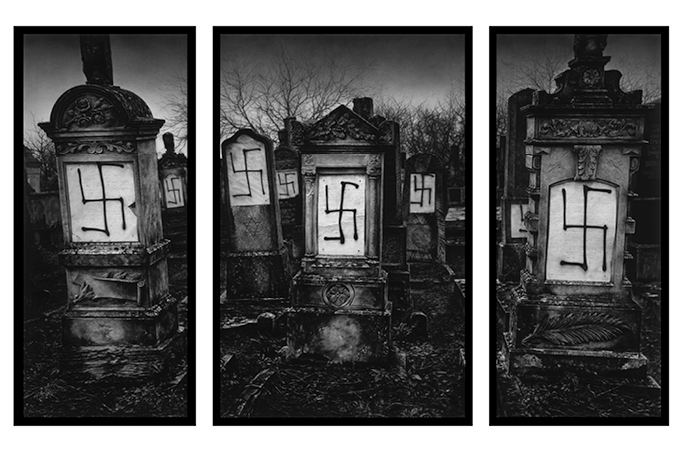
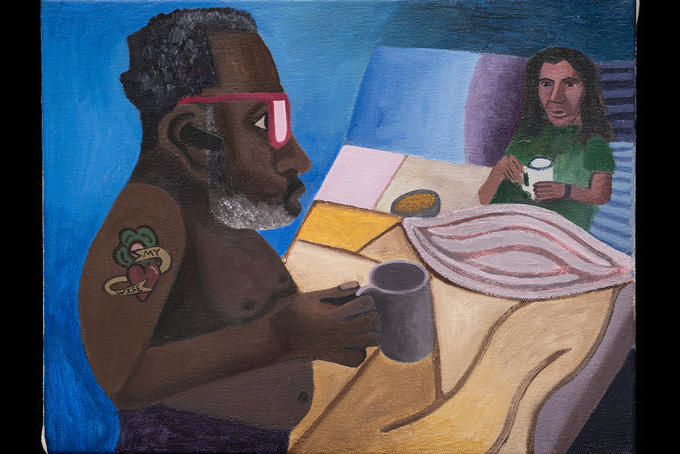
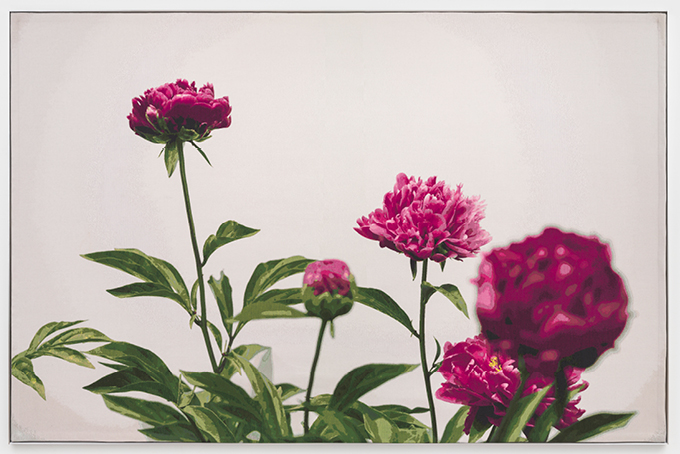
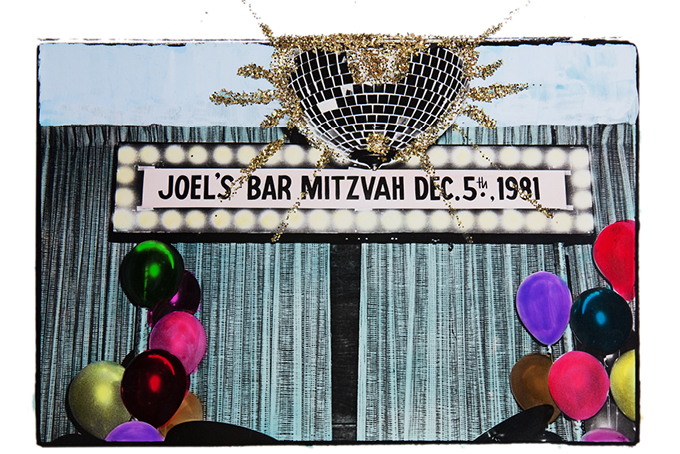

Happy Members Appreciation month! We hope you have been enjoying the extra perks as we continue the festivities throughout the month of May. These are some of the upcoming special days to look out for:
During Member Shopping Week (May 14 – 20), members will receive 20% savings on all in-store and online purchases.
During the last week (May 21 – 28), members can enjoy the Museum and bring along an additional guest for free! While visiting, be sure to check out our latest exhibitions, The Sassoons and After “The Wild”: Contemporary Art from the Barnett and Annalee Newman Foundation Collection.
In case you missed it, enjoy this video of a members-only virtual lecture, which was presented live on Thursday, May 4, as part of Members Appreciation Month. In this lecture, curator Stephen Brown discusses the fascinating history of the renowned artist Marc Chagall on the occasion of the loan of Le Père (1911), a rare portrait of Chagall’s father, on view through January 2024.
Thank you once more for being part of our member community here at the Jewish Museum. Your generosity and enthusiasm keep us going.
Participate in a range of on-site and virtual programs, from online art history classes led over Zoom, to in-person lectures, and more.
In case you missed the February edition, this virtual art history class is back by popular demand. Jewish artists Amedeo Modigliani and Marc Chagall are well-known—Chagall for his lyrical narratives of Jewish life in Vitebsk and Modigliani for his compelling portraits and nudes. Through past Jewish Museum exhibitions, this two-session course explores the lesser-known works of both artists, specifically, the powerful works Chagall created in response to World War II and Modigliani's astonishing drawings, which reveal his artistic process and illuminate the meaning of his paintings.
Tuesdays, May 30 & June 6, 6 pm EDT
Zoom, Virtual Program
Tickets: $30 General; $24 Jewish Museum Members
When persecution forced David Sassoon to flee Baghdad in 1832, he settled in India, inaugurating a flourishing business empire that in the century to come would span the globe from Asia to the family’s new home in Britain. The legacy of this extraordinary saga can be traced through the hundreds of magnificent buildings they built in Baghdad, India, China, and the United Kingdom ranging from synagogues, hospitals, schools, libraries, housing for the working classes, and a home for senior citizens. These buildings, erected during the heyday of colonialism, tell a tale not only of entrepreneurial success, but also of civic engagement and cultural philanthropy. Explore this architectural legacy in a lecture by Esther da Costa Meyer, Professor Emerita at the Department of Art and Archeology at Princeton University and co-curator of The Sassoons.
Thursday, June 1, 6:30 pm
Tickets: $22 General; $15 Students and Seniors; $12 Members
Listen to a talk by Jonathan Kaufman, author of The Last Kings of Shanghai, which details the extraordinary story of the Sassoon and Kadoorie families who stood astride China’s business, politics, and economy for 175 years. This talk is presented in conjunction with the exhibition The Sassoons. Copies of the book will be available for purchase and signing after the event.
Thursday, June 8, 2023, 6:30 pm
Tickets: $22 General; $15 Students and Seniors; $12 Members
At the turn of the last century, John Singer Sargent was acclaimed as a portraitist on both sides of the Atlantic, admired both for his perceptive studies of character and for his sumptuous technique. Complementing the Jewish Museum’s exhibition, The Sassoons, this illustrated lecture by Erica Hirshler, Croll Senior Curator of American Paintings, MFA Boston explores Sargent’s numerous portrayals of Jewish sitters, contextualizing their artistic achievement and exploring the critical response they received. From his electric portrayals of members of the Wertheimer family to his debonair portrait of Philp Sassoon, Sargent’s work reveals an aesthetic agenda intertwined with issues of nationality, heritage, and aspiration.
Thursday, June 29, 6:30 pm
On the Jewish Museum's YouTube Channel
This virtual lecture by Professor Shalva Weil, Senior Researcher at the Hebrew University of Jerusalem, focuses upon members of the Sassoon dynasty in India in their Indian context, from the advent of David Sassoon to Bombay in 1832 until their departure before and after Indian independence in 1947. This program, viewable in this section, premiered on the Jewish Museum's YouTube Channel on May 4, 2023.


As a busy season of Family Concerts, Studio Art Workshops, and Virtual Programming winds down for the summer, keep the kids engaged in art and culture with the Jewish Museum.
When you visit the Jewish Museum with your family this spring, pick up an artist sketchbook guide in the lobby to explore the exhibition After “The Wild”: Contemporary Art from The Barnett and Annalee Newman Foundation Collection. Through looking and drawing activities, discover selected works of art by tapping into your own creativity. This special artist sketchbook offers a self-guided experience for families to enjoy together with a mix of engaging drawing prompts.
“This exhibition is a treasure trove,” says Rachel Levine, Associate Director of Family Programs. “It is brimming with compelling works exploring bold color, juxtapositions of shapes, expressive line, experimentation with materials, and joy in the artist’s process. It was quite difficult to narrow our selection to a few stops since we feel each work is exciting for a multitude of reasons. As a family you may engage with the works in the guide, yet if the child you are with is drawn to additional works, follow their lead and ask them questions about what caught their eye and why. You may consider bringing a small bag with colorful pieces of paper to do a color hunt or a sampling of various textures to find similar materials in the galleries."
DOWNLOAD THE SKETCHBOOK
EXPLORE ALL FAMILY GUIDES & HOLIDAY ART ACTIVITIES
Often the worlds of art and music inspire or inform one another. During the month of May, families with preschool age children have been able to make those connections through a special afterschool program in partnership with the Diller-Quaile School of Music. The final two sessions of the series will explore People + Places in The Sassoons on May 18, and Pattern + Repetition in After “The Wild”: Contemporary Art from The Barnett and Annalee Newman Foundation Collection on May 25. Families may sign up for individual sessions and enjoy two local cultural institutions coming together in this unique series for young children. “The Jewish Museum and the Diller-Quaile School of Music are thrilled to collaborate again on these musical gallery experiences which playfully show how the language of art and music intertwine. We look forward to continuing the series in the fall as well,” says Rachel Levine.
Not already receiving Family Programs updates from the Jewish Museum? Upgrade your membership to the Family level, or sign up for eNews for upcoming art-based programs, holiday-related performances, and more.


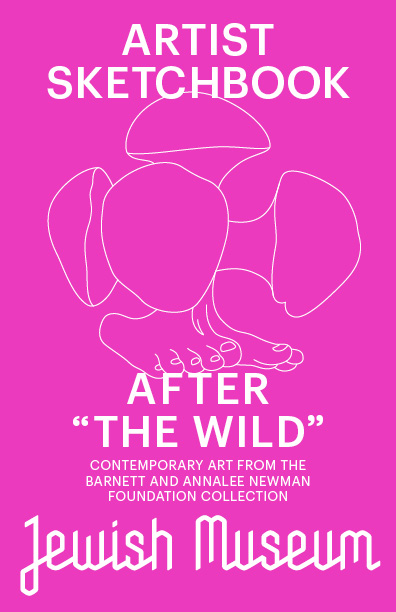
Since its founding, planned giving has played a significant role in the rich history of the Jewish Museum. The Museum was established in 1904 in the library of The Jewish Theological Seminary when Judge Mayer Sulzberger donated a collection of ceremonial art to the library with the suggestion that a Jewish museum be formed. In its first few decades, generous friends and supporters of the Seminary bolstered the growing Museum through gifts and donations.
A transformative gift would come in 1944 from Frieda Schiff Warburg. Frieda and her late husband, Felix Warburg, had built their French Gothic chateau-style mansion on Fifth Avenue in 1908. Philanthropists and supporters of the arts and Jewish life, the Warburgs were involved with a vast array of institutions throughout New York. After living in the mansion for nearly four decades, Frieda, a trustee of the Seminary, chose to donate her former family residence as the new home of the Jewish Museum.
For nearly 120 years, planned gifts and bequests have sustained the Museum. The current exhibition, After “The Wild”: Contemporary Art from the Barnett and Annalee Newman Foundation (shown on this page), is a spectacular example. Following the death of her husband, influential artist Barnett Newman, Annalee Newman started a foundation to support contemporary artists who embodied the spirit and ambition of her late husband. The exhibition features the work of 47 recipients of The Barnett and Annalee Newman Foundation Award. The works in the exhibition, on view through October 1, 2023, were drawn from a larger gift of artwork made to the Jewish Museum by the Foundation in 2018.
You are invited to become a part of this great tradition by joining the Warburg Society. Named in honor of the Warburg family and their incredible contribution, the Warburg Society is a special group of individuals who help to sustain the Jewish Museum through planned gifts or bequests. Members also enjoy invitation-only events at the Museum throughout the year, in thanks for their support.
If you would like to make the Jewish Museum a part of your lasting legacy, please contact Samantha Fleischman at 212.432.3227 or sfleischman@thejm.org.
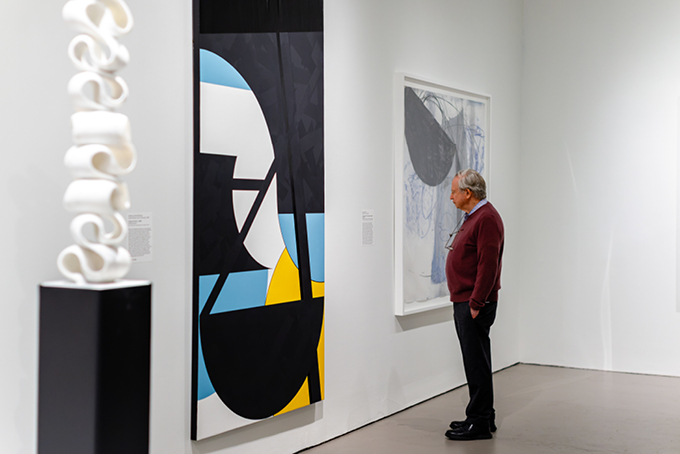
This season, discover a curated range of wedding gifts at the Jewish Museum Shop. Browse a unique selection of items including challah boards and knives, candlesticks, kiddish cups, mezuzahs, ketubahs and more for a beautiful life together.
Tulip Candlesticks by Michael Aram
$440 Price
$396 Members
Velvet Gold Tray by Zanetto
$550 Price
$495 Members
Limited Edition Challah Knife by Florentine Kitchen Knives for the Jewish Museum
$288 Price
$259.20 Members
